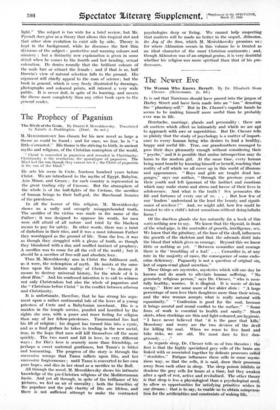The Prophecy of Paganism
The Birth of the Gods. By Dmitri S. Merezhkovsky. Translated by Natalie A. Duddington. (Dent. fis. net.)
M. MEHE2liKOvSKY has chosen for his new novel as large a theme as could be found ; and for once, we fear, he is " a little o-ereasted." His theme is the striving to birth, in ancient
myths and religions, of the Christian conception of the world.
• " Christ is concealed in paganism and revealed in Christianity. Christianity is the revelation, the apocalypse of paganism. The blind feel the sun though they cannot see it ; the Christ of paganism is the sun of the blind.
He sets his scene in Crete, fourteen hundred years before Christ. We are introduced to the myths of Egypt, Babylon, Asia Minor, and Greece ; for each country is represented in
the great trading city of Cnossus. But the atmosphere of the whole is of the bUll-fights of the Cretans, the sacrifice of human beings to their bull-god, the Bacchanal frenzies of the priestesses.
In all the horror of this religion, M. Merezhkovsky shows us a sadly and savagely misapprehended truth. The sacrifice of the victim was made in the name of the Father ; it was designed to appease his wrath, for men were still afraid of all nature and tried by the blackest means to pay for safety. In other words, there was a taint of diabolism in their rites, and it was a most inhuman Father they worshipped as the ground of life. None the less, it was as though they struggled with a gleam of truth, as though they blundered with a dim and muffled instinct of prophecy.
A sacrifice was to come for all the evil of the world ; but it should be a sacrifice of free-will and absolute love.
Thus M. Merezhkovsky sees in Christ the fulfilment and, as it were, the redemption of myth. He insists at the same time upon the historic reality of Christ—" to destroy it means to destroy universal history, for the whole of it is about Him." And his confessed intention is to call to witness not only • Christendom but also the whole of paganism and the " Christians before Christ " in the conflict between atheism and Christianity.
It is unfortunate, therefore, that he has strung his argu- ment upon a rather sentimental tale of the loves of a young priestess of Crete and a Babylonian "merchant. " Dio is a maiden in the temple service, puzzled and horrified by the sights she sees, with a purer and truer feeling for religion than any of her fellow-priestesses. Tammuzadad has had his fill of religion ; his disgust has turned him into a cynic, and as a final gesture he takes to trading in the new metal, iron, in the hope that men will kill themselves off the more- quickly. The two meet and fall in love, in very different ways : for Dio's love is scarcely more than friendship, or. perhaps a sweet maternal gentleness, but Tamu's is bitter and tormenting. The progress of the story is through the successive wrongs that Tamu inflicts upon Dio, and her successive forgivenesses ; until Tamu is converted to her own pure hopes, and -dies in her stead as a sacrifice to the Bull. •
All through the novel,-M. Merezhkoviky shows his intimate knowledge of the pre-Christian religions of the Mediterranean basin. And yet all through, in spite of the brilliance of his' pictures, we feel an air of unreality; both the feroeities The populace and the pale charity of Dio are lifeless, and, there is not sufficient attempt to make the contrasted
psychologies deep or living. We cannot help suspecting that matters will be made no better in the sequel, Akhnaton, Me. Joy of _the Sun, which M. Merezhkovsky promises us : for where Akhnaton occurs, in this volume he is treated as an ideal character of the most Christian sentiments ; and, though Akhnaton was of an original genius, it is very doubtful whether his religion was more spiritual than that of his pre- decessors.






















































 Previous page
Previous page